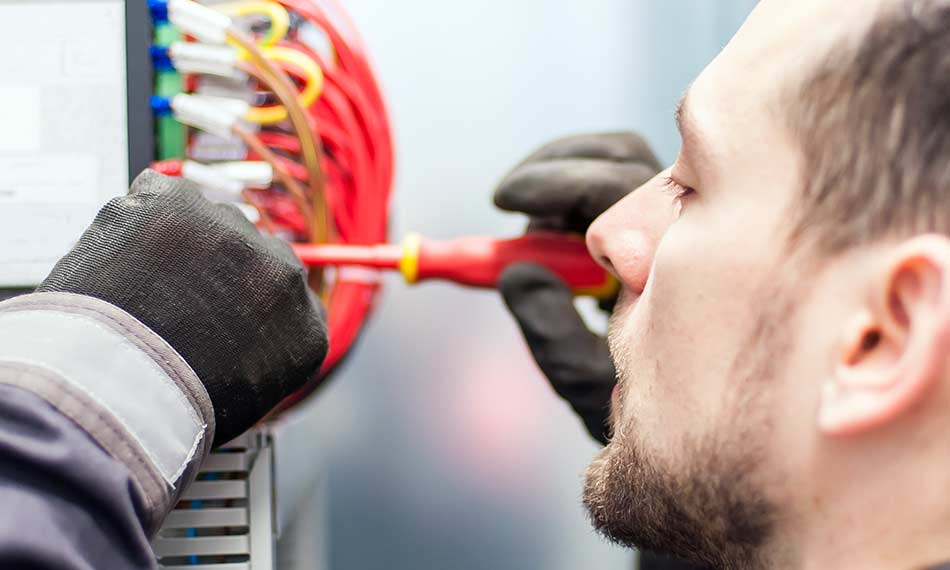Electrical shocks are one of the worst injuries and painful experiences that a person can go through if not careful.
No matter how cautious you are being when working with electricity, you will never be truly safe if you do not wear the appropriate clothing and gear, more specific safety gear that is designed to keep you safe from any electrical hazards.
The clothes you wear should be non-flammable and non-conductive if you are going to be working with electricity in any form, be it being exposed to low voltage or extreme high voltage.
Since your hands will be the most vulnerable part of your body when working with electricity, you need to make sure you are wearing the right kinds of gloves to keep you safe.

Here comes the question of whether rubber gloves are conductive or non-conductive to protect from electrical hazards – the correct answer is they are not conductive, meaning they are poor conductors of electricity. Thereby, protecting you from electrical shocks by creating a barrier between your skin and electricity.
While rubber gloves are the way to go when choosing safety gloves to successfully conduct electrical work without harming yourself, the gloves need to be designed for electrical use only.
In this article, you will learn more about rubber gloves, their advantages, their features, and the right way to care for them.
We sure do hope you find this article helpful in giving you all the necessary information when it comes to choosing the right work gloves for your work.
Who should wear rubber gloves?
Rubber as a material is a good insulator naturally, hence, does not conduct electricity. So for anyone working with electricity, be it a professional electrician or a layman doing minor electrical work at home, should wear rubber gloves.
Keep in mind the rubber gloves are specifically designed for safety against electrical shocks and other injuries caused when exposed to electrical appliances and the likes. There are various types of rubber gloves available to suit different jobs.
For instance, the rubber gloves that you would wear to do your household chores cannot be worn as safety gloves when doing any sort of electrical work in and around the house.
They will not protect you from any electrical mishaps as they are not made from 100% rubber, but a mix of other materials too in order to make them more comfortable and suitable for the household work at hand.
Working with electricity is a very hazardous work environment that comes with challenges that affect the health of a person. By wearing the right kind of safety rubber gloves, one can protect themselves from such hazards.
The benefits of wearing rubber gloves that are meant for working with electricity
Now that you know that an electrician or any person who does minor electrical work around their own house should wear rubber gloves when working, let me explain to you the various benefits these gloves come with.
1.) Wearing a pair of rubber insulated gloves will protect you from electrical shocks as rubber is a good insulator and a poor conductor of electricity.
2.) The rubber gloves will block the current from flowing through it to the skin.
3.) The safety gloves will protect your hands against punctures caused by sharp objects at the workplace or job site.
4.) Your nerves will not be harmed when wearing the right kind of rubber gloves if you come in contact with low or high voltage.
5.) The risk dangers of dermatitis, cuts, and scrapes will be highly minimized when wearing electrician safety gloves.
6.) Whether you are working with low voltage or high voltage, you will be able to work with peace and ease of mind by wearing rubber gloves.
7.) Your hands will be shielded from getting burnt by possible short circuits and fires.
8.) Rubber gloves specifically designed for the safety of an electrician come loaded with features like excellent grip, which is very helpful when dealing with several tools.
See also: Can You Touch a Live Wire with Rubber Gloves?
Features an electrician should consider when buying work gloves
There are a few very important features that an electrician should consider when buying work safety gloves.
1.) The material
First and foremost you need to get gloves made of rubber. Since rubber as a material is a poor conductor of electricity, it will protect you against electric shocks.
It is also non-flammable, hence it will not catch fire. Depending on the weather conditions you work in, if you work in cold temperatures then buying gloves with a fleece lining is an added bonus as they will keep your hands warm and toasty.
Similarly, if you work in hot temperatures then get gloves that have a cotton lining to keep your hands cool and dry. The gloves should be able to wick away the moisture as working in wet gloves will be dangerous when exposed to any electrical wires.
2.) The fit
Wearing the correct size of gloves is equally vital when working. You do not want to wear something that is too tight or too loose, as it will not serve the purpose of protecting you from all the workplace hazards.
The gloves should allow you to move your fingers and hands with ease and there must be enough mobility. It is necessary that you feel comfortable when working.
It is advisable to measure your hands before finalizing on a pair of gloves in order for you to get the right size and fit. Not everyone one of you out there will be able to gauge whether you need a medium, large or extra-large gloves.
3.) Insulation factor
As an electrician, you need to wear rubber insulated gloves to give you the maximum amount of safety when working with electrical wires, current, high or low voltage.
Such safety gloves are labeled with colored codes, according to the level of protection they can provide against different levels of voltages. These standards are set by ASTM and OSHA and are classified from protecting you against the lowest amount of voltage to the highest amount.
Therefore, depending on the kind of work you do daily as an electrician, you need to choose the right pair of gloves for yourself. As not every electrician will be working with or exposed to the same amount of voltage.
Here are the various classifications that you will notice on electrical safety gloves:
Class 00 – maximum voltage 500V
Class 0 – maximum voltage 1000V
Class 1 – maximum voltage 7500V
Class 2 – maximum voltage 17000V
Class 3 – maximum voltage 26500V
Class 4 – maximum voltage 36000V
4.) Protection factor
It is quite likely for you to get cuts, scrapes, and also punctures while working. Therefore, the gloves should have an additional layer of protection against such physical damages and hazards.
A lot of the good rubber insulated gloves have a leather protector on the inside and sometimes even outside. As leather is known to be a strong material that can resist such punctures.
See also: The Best Cold Weather Work Gloves for Electricians
Tips on how to care for your rubber gloves
For you to get the most out of your rubber gloves, you need to maintain them with utmost care. A good quality pair of gloves will not come cheap, so it is better you get maximum use out of them by taking good care of them.
Here are a few tips on how to care for your rubber gloves.
1.) When storing your electrical safety gloves, you need to make sure they are kept in a cool, dark, and dry place which is away from any harmful chemicals, direct sunlight, humidity, and ozone. There should be nothing on top of the glove storage box or bag.
2.) Always make it a point to clean the gloves well before storing them away. If there is any chemical or oil on the gloves, take some mild detergent and lukewarm water to wipe them clean as soon as early as possible. After which you should air dry them and not by using any heating device.
3.) Keep your gloves away from any kind of talcum powder as it will minimize the insulation properties of the rubber gloves.
So instead you should use glove powder which is approved and advised by the manufacturer to help soak or absorb the sweat that is formed inside your gloves.
4.) There is a chance you might miss a tiny hole or two somewhere on the gloves. It is also possible that there is wear and tear which you do not notice.
Hence, do a thorough inspection of your gloves before each and every use, so that you know when to replace them accordingly.
See also: How Often Should I Change My Rubber Gloves?
Wrapping up
It is no surprise that accidents can happen anytime and they always come knocking on your door unannounced. Therefore, it is important to be aware and prepared for whatever might come your way and harm you physically.
Before making an attempt to involve yourself with any kind of electrical work, you should make it a point to educate yourself about all the possible hazards that come with such work in order to reduce the probability of accidents.







